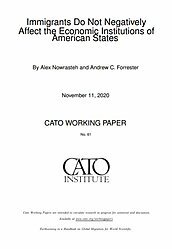Freer immigration could potentially lead to trillions of dollars in additional annual global output. However, the movement of many more immigrants could produce negative externalities that swamp the benefits, particularly if immigrants undermine productivity in their new countries by bringing with them the institutions or cultures that are responsible for low productivity in their home countries. We examine this by seeing how immigrants affect state budgets — a proxy for the quality of economic institutions — between 1970 and 2010 in the United States. We find that larger immigrant shares of the population produce large reductions in the growth of real per capita tax revenue and outlays in the short run that moderate to smaller longer-term growth declines in both.


